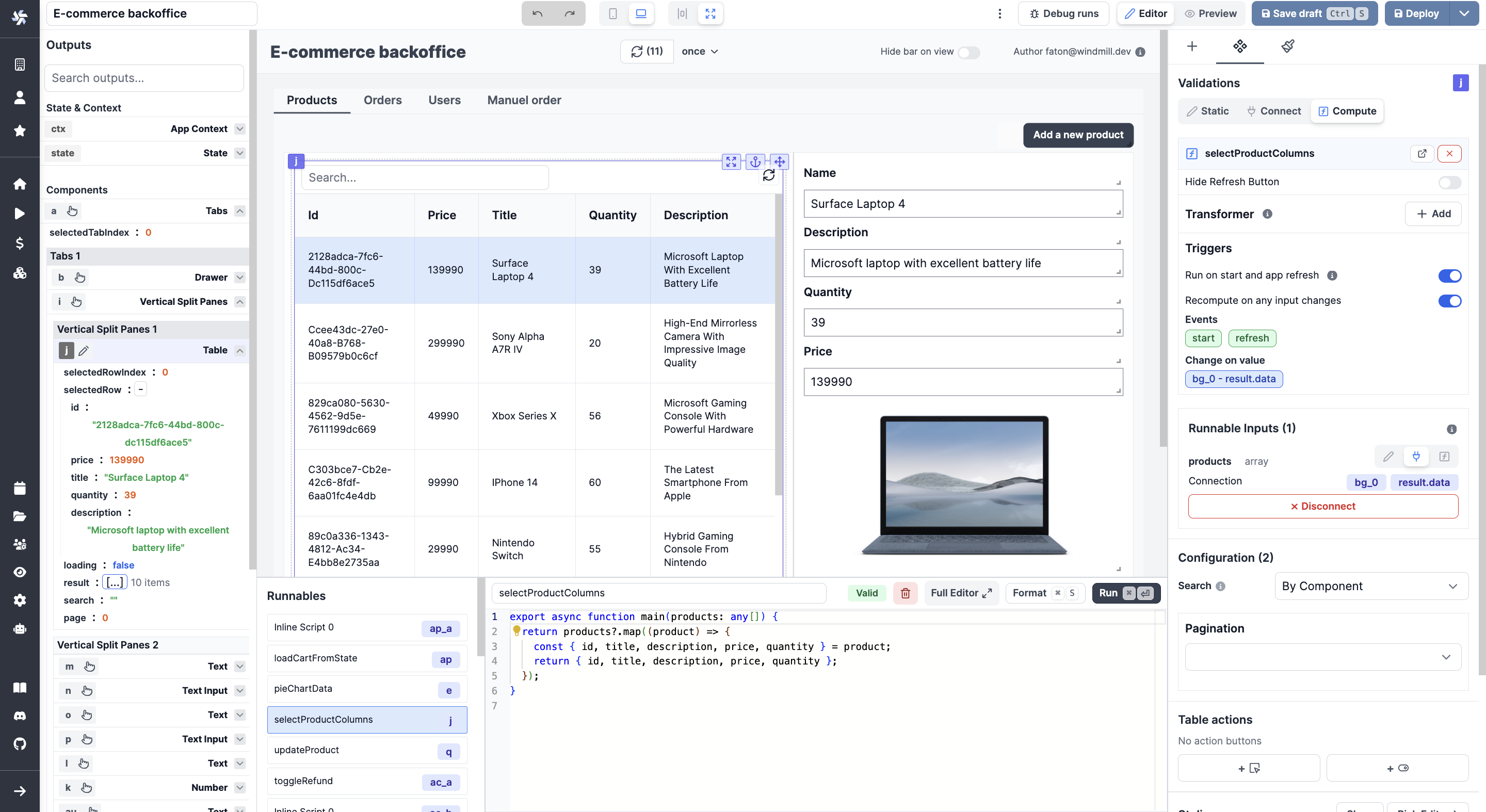.
Open-source developer infrastructure for internal tools. Self-hostable alternative to Airplane, Pipedream, Superblocks and a simplified Temporal with autogenerated UIsm and custom UIs to trigger workflows and scripts as internal apps.
Scripts are turned into UIs and no-code modules, no-code modules can be composed into very rich flows, and script and flows can be triggered from internal UIs made with a low-code builder. The script languages supported are: Python, Typescript, Go, Bash, SQL.
Try it - Docs - Discord - Hub - Contributor's guide
Windmill is fully open-sourced (AGPLv3) and Windmill Labs offers dedicated instance and commercial support and licenses.
main.mp4
- Windmill - Turn scripts into workflows and UIs that you can share and run at scale
-
Define a minimal and generic script in Python, Typescript, Go or Bash that solves a specific task. Here sending a POST request. The code can be defined in the provided Web IDE or synchronized with your own github repo:
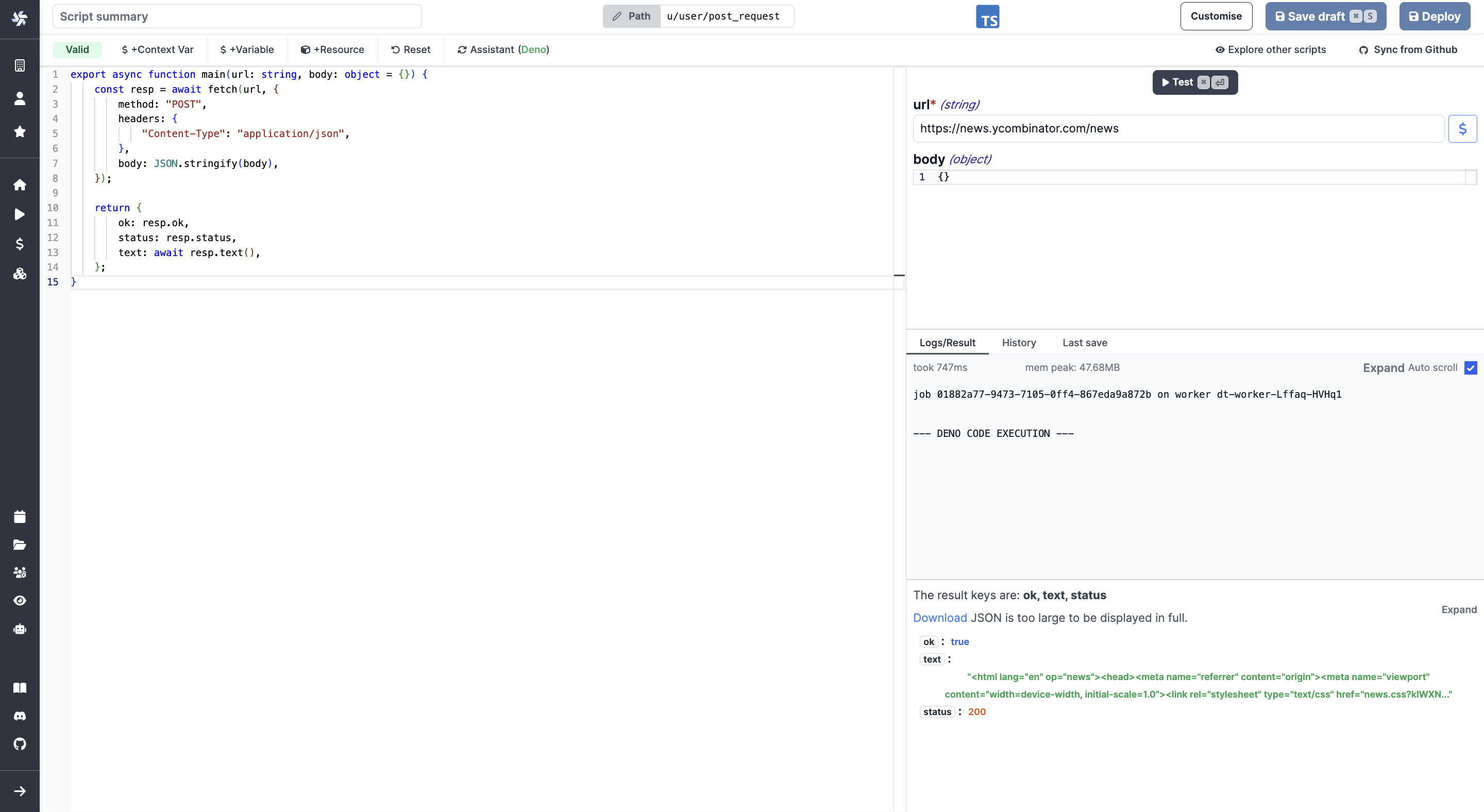
-
Your scripts parameters are automatically parsed and generate a frontend.
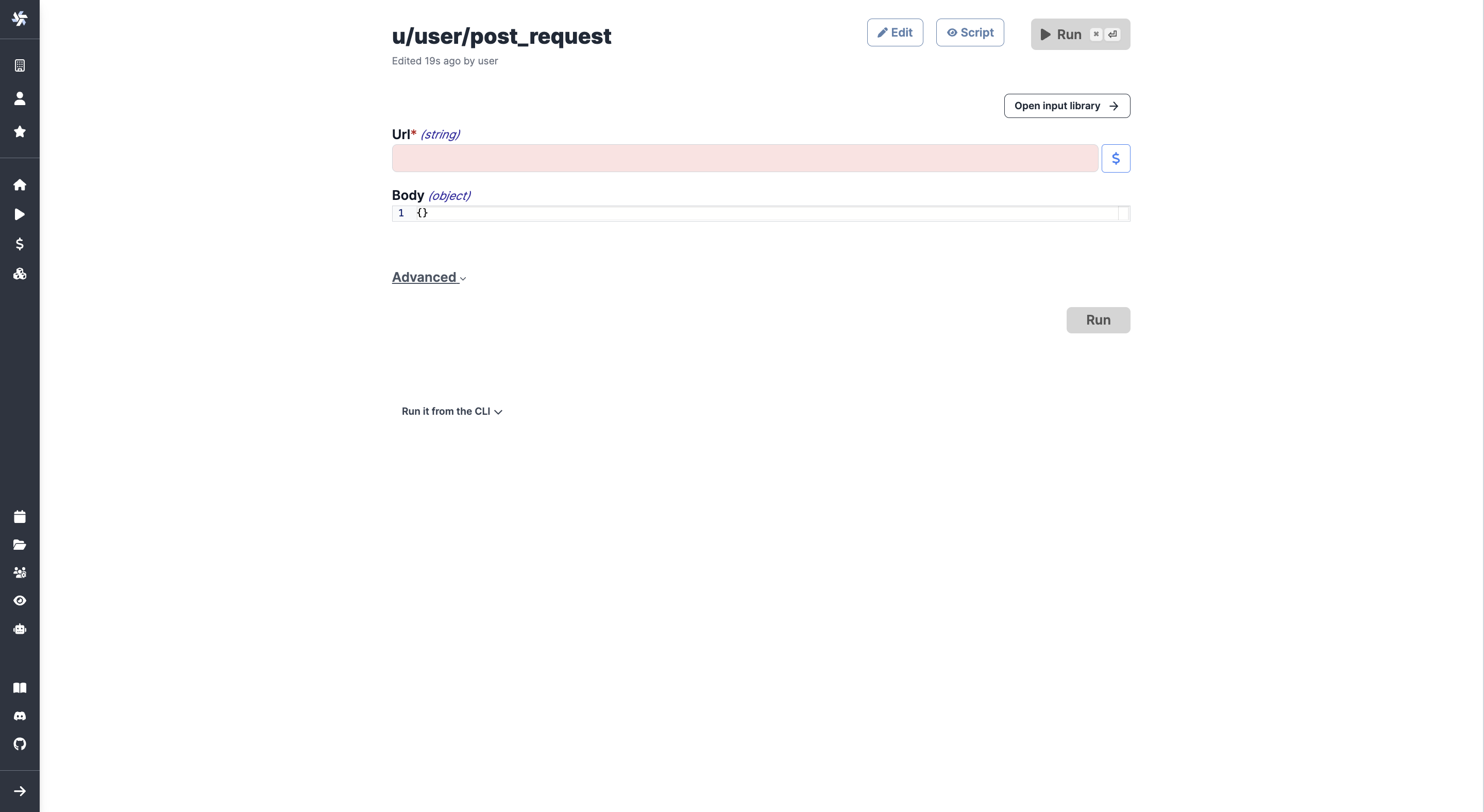
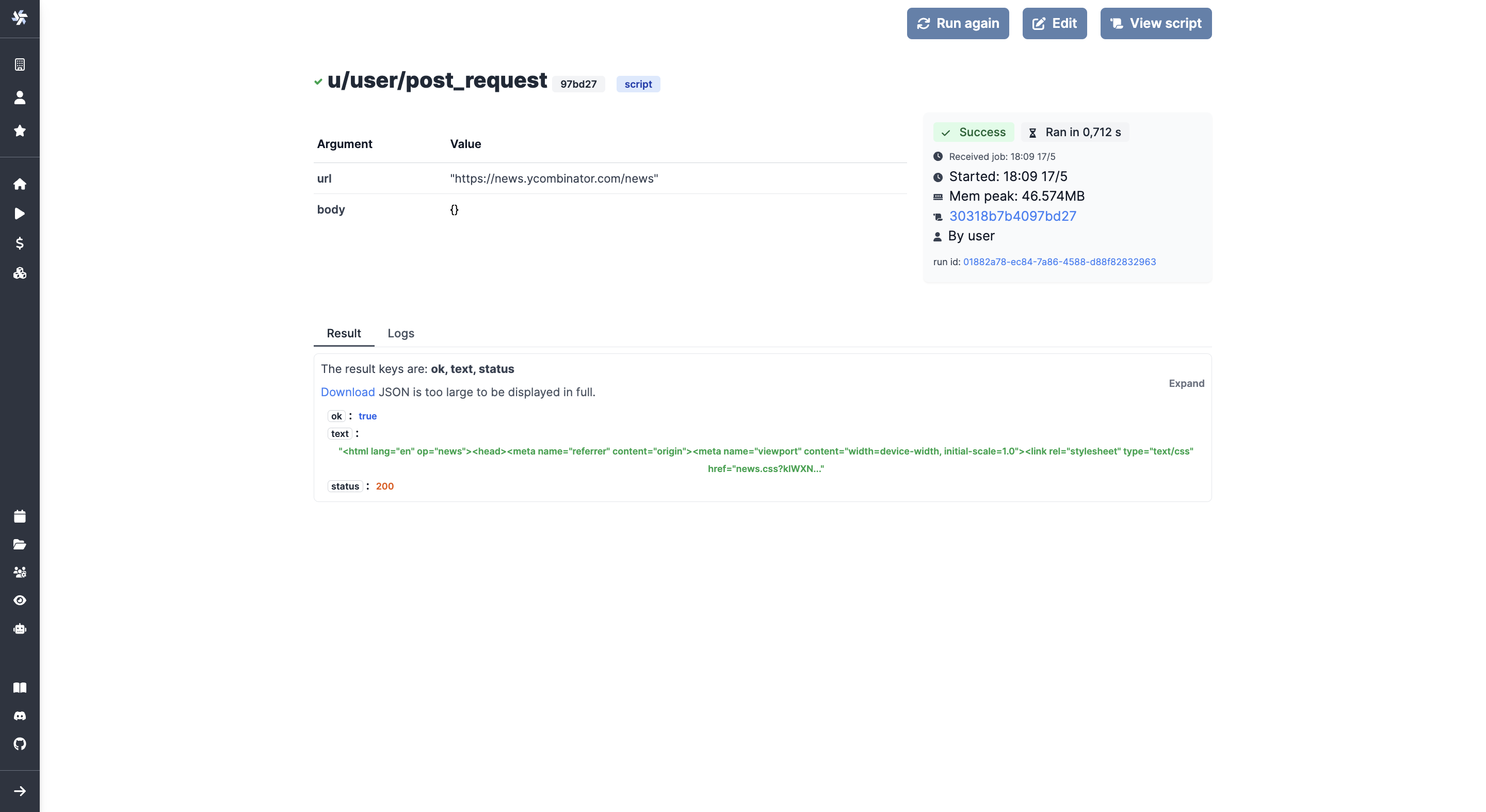
-
Make it flow! You can chain your scripts or scripts made by the community shared on WindmillHub.
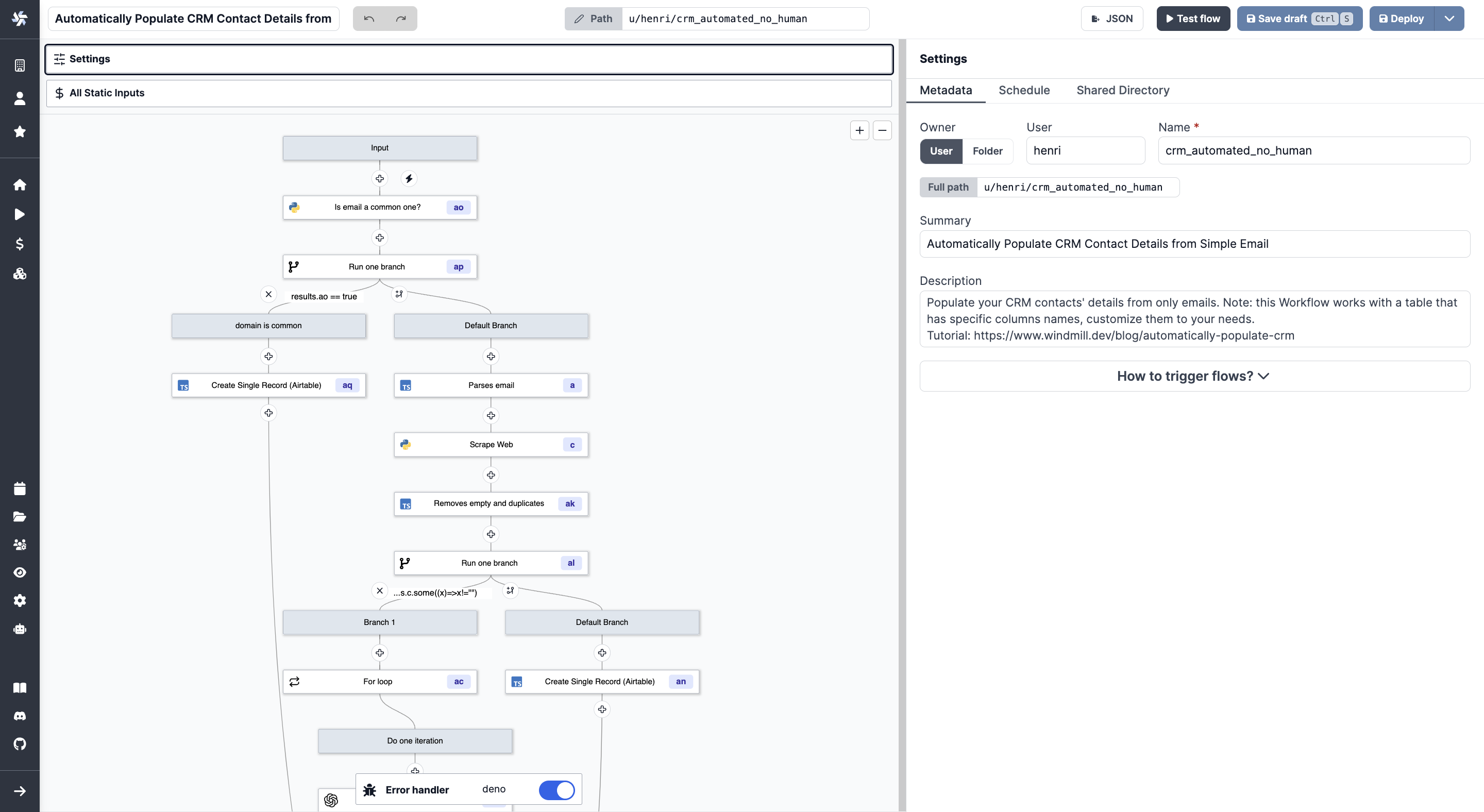
Scripts and flows can also be triggered by a cron schedule '_/5 _ * * *' or through webhooks.
You can build your entire infra on top of Windmill!
import * as wmill from "https://deno.land/x/[email protected]/mod.ts";
//import any dependency from npm
import cowsay from "npm:[email protected]";
export async function main(
a: number,
// unions generate enums
b: "my" | "enum",
// default parameters prefill the field
d = "default arg",
// nested objects work c = { nested: "object" },
// permissioned and typed json
db: wmill.Resource<"postgresql">
) {
const email = Deno.env.get("WM_EMAIL");
// variables are permissioned and by path
let variable = await wmill.getVariable("f/company-folder/my_secret");
const lastTimeRun = await wmill.getState();
// logs are printed and always inspectable
console.log(cowsay.say({ text: "hello " + email + " " + lastTimeRun }));
await wmill.setState(Date.now());
// return is serialized as JSON
return { foo: d, variable };
}We have a powerful CLI to interact with the windmill platform and sync your scripts from local files, github repos and to run scripts and flows on the instance from local commands. See more details.
You can run your script locally easily, you simply need to pass the right
environment variables for the wmill client library to fetch resources and
variables from your instance if necessary. See more:
https://www.windmill.dev/docs/advanced/local_development/.
- Postgres as the database
- backend in Rust with the following highly-available and horizontally scalable
architecture:
- stateless API backend
- workers that pull jobs from a queue in Postgres (and later, Kafka or Redis. Upvote #173 if interested )
- frontend in Svelte
- scripts executions are sandboxed using google's nsjail
- javascript runtime is the deno_core rust library (which itself uses the rusty_v8 and hence V8 underneath)
- typescript runtime is deno
- python runtime is python3
- golang runtime is 1.19.1
Windmill uses nsjail on top of the deno sandboxing. It is production multi-tenant grade secure. Do not take our word for it, take fly.io's one.
There is one encryption key per workspace to encrypt the credentials and secrets stored in Windmill's K/V store.
In addition, we strongly recommend that you encrypt the whole Postgres database. That is what we do at https://app.windmill.dev.
Once a job started, there is no overhead compared to running the same script on the node with its corresponding runner (Deno/Go/Python/Bash). The added latency from a job being pulled from the queue, started, and then having its result sent back to the database is ~50ms. A typical lightweight deno job will take around 100ms total.
We only provide docker-compose setup here. For more advanced setups, like compiling from source or using without a postgres super user, see documentation.
curl https://raw.githubusercontent.com/windmill-labs/windmill/main/docker-compose.yml -o docker-compose.yml
curl https://raw.githubusercontent.com/windmill-labs/windmill/main/Caddyfile -o Caddyfile
curl https://raw.githubusercontent.com/windmill-labs/windmill/main/.env -o .env
docker compose up -d
Go to http://localhost et voilà :)
The default super-admin user is: [email protected] / changeme.
From there, you can follow the setup app and create other users.
We publish helm charts at: https://github.com/windmill-labs/windmill-helm-charts.
If you do not want, or cannot (for instance, in AWS Aurora or Cloud sql) use a
postgres superuser, you can run ./init-db-as-superuser.sql to init the
required users for Windmill.
To self-host Windmill, you must respect the terms of the AGPLv3 license which you do not need to worry about for personal uses. For business uses, you should be fine if you do not re-expose it in any way Windmill to your users and are comfortable with AGPLv3.
To re-expose any Windmill parts to your users as a feature of your product, or to build a feature on top of Windmill, to comply with AGPLv3 your product must be AGPLv3 or you must get a commercial license. Contact us at [email protected] if you have any doubts.
In addition, a commercial license grants you a dedicated engineer to transition your current infrastructure to Windmill, support with tight SLA, and our global cache sync for high-performance/no dependency cache miss of cluster from 10+ nodes to 200+ nodes.
To get the same oauth integrations as Windmill Cloud, mount oauth.json with
the following format:
{
"<client>": {
"id": "<CLIENT_ID>",
"secret": "<CLIENT_SECRET>",
"allowed_domains": ["windmill.dev"] //restrict a client OAuth login to some domains
}
}and mount it at /usr/src/app/oauth.json.
The redirect url for the oauth clients is:
<instance_url>/user/login_callback/<client>
Even if you setup oauth, you will still want to login as [email protected] / changeme to setup your instance as a super-admin and give yourself admin rights.
The list of all possible "connect an app" oauth clients
To add more "connect an app" OAuth clients to the Windmill project, read the Contributor's guide. We welcome contributions!
You may also add your own custom OAuth2 IdP and OAuth2 Resource provider:
{
"<client>": {
"id": "<CLIENT_ID>",
"secret": "<CLIENT_SECRET>",
// To add a new OAuth2 IdP
"login_config": {
"auth_url": "<auth_endpoint>",
"token_url": "<token_endpoint>",
"userinfo_url": "<userinfo endpoint>",
"scopes": ["scope1", "scope2"],
"extra_params": "<if_needed>"
},
// To add a new OAuth2 Resource
"connect_config": {
"auth_url": "<auth_endpoint>",
"token_url": "<token_endpoint>",
"scopes": ["scope1", "scope2"],
"extra_params": "<if_needed>"
}
}
}For users to receive emails when you invite them to workspaces or add them to the instances using their emails, configure the SMTP env variables in the servers:
[email protected]
SMTP_HOST=smtp.gmail.com
SMTP_PORT=587
[email protected]
SMTP_PASSWORD=yourpasswordapp
You will also want to import all the approved resource types from WindmillHub. A setup script will prompt you to have it being synced automatically everyday.
| Environment Variable name | Default | Description | Api Server/Worker/All |
|---|---|---|---|
| DATABASE_URL | The Postgres database url. | All | |
| DISABLE_NSJAIL | true | Disable Nsjail Sandboxing | Worker |
| SERVER_BIND_ADDR | 0.0.0.0 | IP Address on which to bind listening socket | Server |
| PORT | 8000 | Exposed port | Server |
| NUM_WORKERS | 3 | The number of worker per Worker instance (set to 1 on Eks to have 1 pod = 1 worker, set to 0 for an API only instance) | Worker |
| DISABLE_SERVER | false | Binary would operate as a worker only instance | Worker |
| METRICS_ADDR | None | The socket addr at which to expose Prometheus metrics at the /metrics path. Set to "true" to expose it on port 8001 | All |
| JSON_FMT | false | Output the logs in json format instead of logfmt | All |
| BASE_URL | http://localhost:8000 | The base url that is exposed publicly to access your instance | Server |
| TIMEOUT | 300 | The maximum time of execution of a script. When reached, the job is failed as having timedout. | Worker |
| ZOMBIE_JOB_TIMEOUT | 30 | The timeout after which a job is considered to be zombie if the worker did not send pings about processing the job (every server check for zombie jobs every 30s) | Server |
| RESTART_ZOMBIE_JOBS | true | If true then a zombie job is restarted (in-place with the same uuid and some logs), if false the zombie job is failed | Server |
| SLEEP_QUEUE | 50 | The number of ms to sleep in between the last check for new jobs in the DB. It is multiplied by NUM_WORKERS such that in average, for one worker instance, there is one pull every SLEEP_QUEUE ms. | Worker |
| MAX_LOG_SIZE | 500000 | The maximum number of characters a job can emit (log + result) | Worker |
| DISABLE_NUSER | false | If Nsjail is enabled, disable the nsjail's clone_newuser setting |
Worker |
| KEEP_JOB_DIR | false | Keep the job directory after the job is done. Useful for debugging. | Worker |
| LICENSE_KEY (EE only) | None | License key checked at startup for the Enterprise Edition of Windmill | Worker |
| S3_CACHE_BUCKET (EE only) | None | The S3 bucket to sync the cache of the workers to | Worker |
| TAR_CACHE_RATE (EE only) | 100 | The rate at which to tar the cache of the workers. 100 means every 100th job in average (uniformly randomly distributed). | Worker |
| SLACK_SIGNING_SECRET | None | The signing secret of your Slack app. See Slack documentation | Server |
| COOKIE_DOMAIN | None | The domain of the cookie. If not set, the cookie will be set by the browser based on the full origin | Server |
| DENO_PATH | /usr/bin/deno | The path to the deno binary. | Worker |
| PYTHON_PATH | /usr/local/bin/python3 | The path to the python binary. | Worker |
| GO_PATH | /usr/bin/go | The path to the go binary. | Worker |
| GOPRIVATE | The GOPRIVATE env variable to use private go modules | Worker | |
| GOPROXY | The GOPROXY env variable to use | Worker | |
| NETRC | The netrc content to use a private go registry | Worker | |
| PIP_INDEX_URL | None | The index url to pass for pip. | Worker |
| PIP_EXTRA_INDEX_URL | None | The extra index url to pass to pip. | Worker |
| PIP_TRUSTED_HOST | None | The trusted host to pass to pip. | Worker |
| PATH | None | The path environment variable, usually inherited | Worker |
| HOME | None | The home directory to use for Go and Bash , usually inherited | Worker |
| DATABASE_CONNECTIONS | 50 (Server)/3 (Worker) | The max number of connections in the database connection pool | All |
| SUPERADMIN_SECRET | None | A token that would let the caller act as a virtual superadmin [email protected] | Server |
| TIMEOUT_WAIT_RESULT | 20 | The number of seconds to wait before timeout on the 'run_wait_result' endpoint | Worker |
| QUEUE_LIMIT_WAIT_RESULT | None | The number of max jobs in the queue before rejecting immediately the request in 'run_wait_result' endpoint. Takes precedence on the query arg. If none is specified, there are no limit. | Worker |
| DENO_AUTH_TOKENS | None | Custom DENO_AUTH_TOKENS to pass to worker to allow the use of private modules | Worker |
| DENO_FLAGS | None | Override the flags passed to deno (default --allow-all) to tighten permissions. Minimum permissions needed are "--allow-read=args.json --allow-write=result.json" | Worker |
| NPM_CONFIG_REGISTRY | None | Registry to use for NPM dependencies, set if you have a private repository you need to use instead of the default public NPM registry | Worker |
| PIP_LOCAL_DEPENDENCIES | None | Specify dependencies that are installed locally and do not need to be solved nor installed again | |
| ADDITIONAL_PYTHON_PATHS | None | Specify python paths (separated by a :) to be appended to the PYTHONPATH of the python jobs. To be used with PIP_LOCAL_DEPENDENCIES to use python codebases within Windmill | Worker |
| INCLUDE_HEADERS | None | Whitelist of headers that are passed to jobs as args (separated by a comma) | Server |
| WHITELIST_WORKSPACES | None | Whitelist of workspaces this worker takes job from | Worker |
| BLACKLIST_WORKSPACES | None | Blacklist of workspaces this worker takes job from | Worker |
| INSTANCE_EVENTS_WEBHOOK | None | Webhook to notify of events such as new user added, signup/invite. Can hook back to windmill to send emails | |
| GLOBAL_CACHE_INTERVAL | 10*60 | (Enterprise Edition only) Interval in seconds in between bucket sync of the cache. This interval * 2 is the time at which you're guaranteed all the worker's caches are synced together. | Worker |
| WORKER_TAGS | 'deno,go,python3,bash,flow,hub,dependency' | The worker groups assigned to that workers | Worker |
| CUSTOM_TAGS | None | The custom tags assignable to scripts. | Server |
| JOB_RETENTION_SECS | 606024*60 //60 days | The time in seconds after which jobs get deleted. Set to 0 or -1 to never delete | |
| WAIT_RESULT_FAST_POLL_INTERVAL_MS | 50 | The time in between polling for the run_wait_result endpoints in fast poll mode | Server |
| WAIT_RESULT_SLOW_POLL_INTERVAL_MS | 200 | The time in between polling for the run_wait_result endpoints in fast poll mode | Server |
| WAIT_RESULT_FAST_POLL_DURATION_SECS | 2 | The duration of fast poll mode before switching to slow poll | Server |
| EXIT_AFTER_NO_JOB_FOR_SECS | None | Exit worker if no job is received after duration in secs if defined | Worker |
| OAUTH_JSON_AS_BASE64 | None | Base64 encoded JSON of the OAuth configuration. e.g OAUTH_JSON_AS_BASE64=$(base64 oauth.json | tr -d '\n') to encode it |
Server |
| REQUEST_SIZE_LIMIT | 2097152 (2MB) | Max request size which impact the maximum size of resources and payload size of job args | Server |
| ACCEPT_INVALID_CERTS | false | Accept invalid certificates, including self-signed and expired certificates | Server |
| HTTP_PROXY | None | http_proxy | Server + Worker |
| HTTPS_PROXY | None | https_proxy | Server + Worker |
| NO_PROXY | None | no_proxy | Server + Worker |
| SMTP_FROM | None | the address to use as the from field for emails send | Server |
| SMTP_HOST | None | host for the smtp server to send invite emails | Server |
| SMTP_PORT | 587 | port for the smtp server to send invite emails | Server |
| SMTP_USERNAME | None | username for the smtp server to send invite emails | Server |
| SMTP_PASSWORD | None | password for the smtp server to send invite emails | Server |
| SMTP_TLS_IMPLICIT | false | https://docs.rs/mail-send/latest/mail_send/struct.SmtpClientBuilder.html#method.implicit_tlsemails | Server |
| CREATE_WORKSPACE_REQUIRE_SUPERADMIN | false | If true, only superadmin can create workspaces | Server |
| GLOBAL_ERROR_HANDLER_PATH_IN_ADMINS_WORKSPACE | None | Path to a script to run when a root job fails. The script will be run in and from the admins workspace | Server |
This will use the backend of https://app.windmill.dev but your own frontend with hot-code reloading.
- Go to
frontend/:npm installnpm run generate-backend-clientnpm run dev
- Et voilà, windmill should be available at
http://localhost:3000/
See the ./frontend/README_DEV.md file for all running options.
- Create a Postgres Database for Windmill and create an admin role inside your
Postgres setup. The easiest way to get a working postgres is running
cargo install sqlx-cli && sqlx migrate run. This will also avoid compile time issue with sqlx'squery!macro - Install nsjail and have it accessible in your PATH
- Install deno and python3, have the bins at
/usr/bin/denoand/usr/local/bin/python3 - Install caddy
- Go to
frontend/:npm install,npm run generate-backend-clientthennpm run dev- In another shell
npm run buildotherwise the backend will not find thefrontend/buildfolder and will crash - In another shell
sudo caddy run --config Caddyfile
- Go to
backend/:DATABASE_URL=<DATABASE_URL_TO_YOUR_WINDMILL_DB> RUST_LOG=info cargo run - Et voilà, windmill should be available at
http://localhost/
Windmill Labs, Inc 2023





